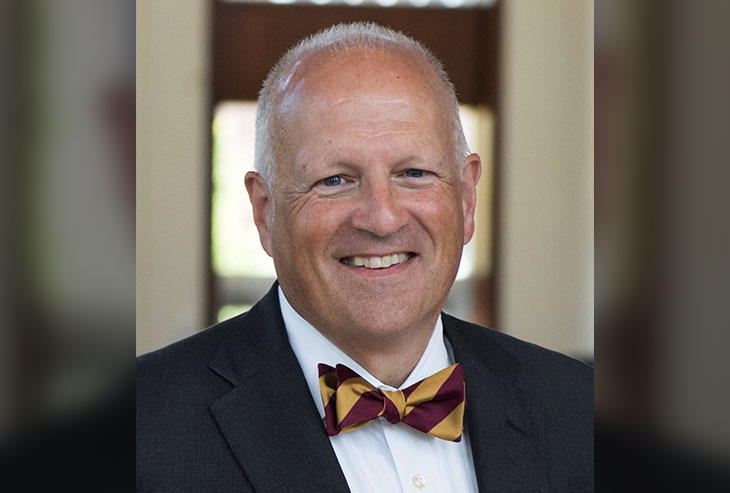In this column originally published by Interfaith Youth Core and then distributed by the Elon University Writers Syndicate, President Emeritus Leo M. Lambert writes about ways that those in higher education can continue to "be the human" during this time of remote learning.
By Leo M. Lambert
After 20 years of service as president of Elon University, I co-authored a book with my colleague, Peter Felten, titled “Relationship-Rich Education: How Human Connections Drive Success in College,” to be published later this year from Johns Hopkins University Press. Throughout the last two weeks of social distancing, I have wondered if there was ever a worse time in human history to come out with a book with that title.

However, I am now coming around to the view that there may never be a better time.
I sense that we are rediscovering in the most powerful and profound ways that human relationships are the very heartbeat of the collegiate experience. The networks of relationships that students build in college with faculty members, all manner of staff, mentors, coaches, chaplains, and influential peers are not the “icing on the cake” of the collegiate experience — they are the cake itself. Our book is filled with stories of students at every type of institution — from open access community colleges to large, public research universities to the Ivy League — whose destinies were changed because of one critical conversation. One human connection can make a transformational difference.
Even in the world of online higher education, human contact matters. In doing research for our book, we visited Southern New Hampshire University — with 90,000 on-line students — which employs writing coaches to help students unpack their assignments and discuss drafts of essays, but also to offer encouragement and to get to know students as people over time. One of the coaches, Kayleigh Guzel, notes, “Students are alone in the cloud essentially. They have discussion boards where they can interact with peers and they have e-mail, but the only voices they really hear are ours and their academic advisor’s. So, we are able to be the human. That’s what we do.” Such is the power of the human voice.
Millions of college students have suddenly found themselves “alone in the cloud.” Kayleigh Guzel’s call to “be the human” in students’ virtual worlds, is an urgent one.
Recently I invited some first-year seminar students from last fall to reconvene for a video conference reunion just to check in with them, with most of them joining in from the bedrooms of their childhood homes. One young woman poignantly noted that she would never again take for granted what college provided: the unplanned meetings on the sidewalk that turn out to be lifechanging, the debates enjoyed over shared meals, the long conversations in faculty members’ offices and the embrace from a friend during tough times.
Despite the heroic efforts of my faculty colleagues to create the most engaging spaces possible online, students mourn the loss of regular, spontaneous and nourishing human contact. They know they are missing something sacred. And they are fearful they might not get it back anytime soon.
I do not know what the landscape of American higher education is going to look like come autumn. I hope and pray that we will be able to return to our physical campuses and rebuild our communities.
My instinct is that the broader landscape will never be quite the same as before. Some institutions will not survive the financial shock, and many will take years to recover from it. Working from home and our sustained experiences with videoconferencing platforms may change our understanding of what “going to work” means.
I wonder if we will be less likely to hop on a plane for meetings and professional development and seek new ways to foster scholarly and academic associations. And how the current crisis will reshape families, American culture, elections, and the future of travel is anyone’s guess.
I have decided to center my thoughts upon being grateful for the heroes surrounding me—doctors, nurses, grocery store re-stockers, delivery drivers and everyone doing their part by staying at home. But, I am also grateful for the heroes of higher education: those that continue to feed and support those students who could not leave campus; teachers who are exploring every creative avenue to make learning meaningful in these times; those who have stayed to keep our physical campuses safe and functioning; administrators and faculty who are thinking about alternative ways to celebrate this historic Class of 2020; and everyone who is working day and night to “be the human” to the students they love and cherish.
Elon’s mascot is the Phoenix. I am a Phoenix. I believe the certainty of rising and new beginnings — and our time for rising from this crisis will soon be here.
—
Views expressed in this column are the author’s own and not necessarily those of Elon University.



